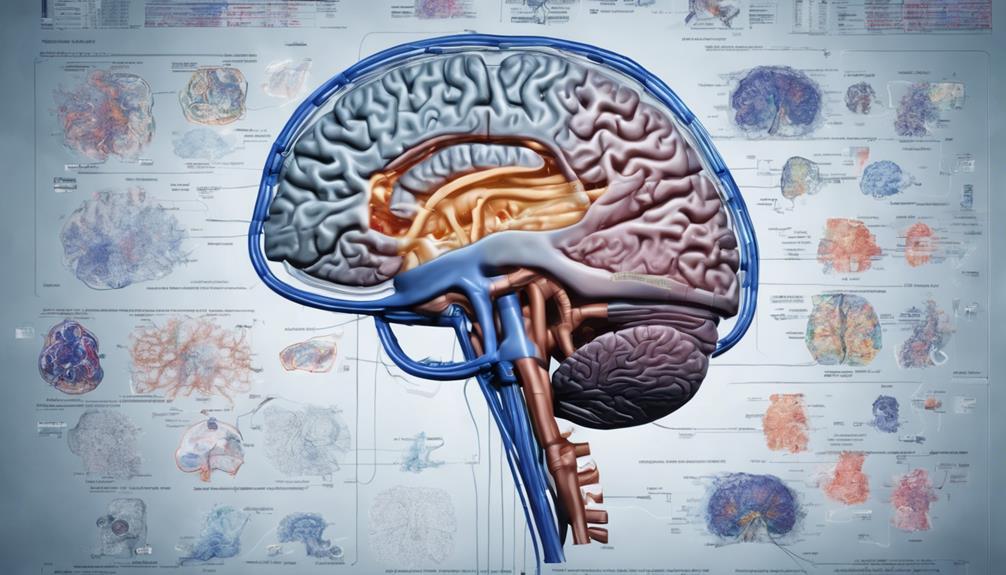Understanding the differences between delirium and dementia is essential in medical settings. Delirium’s sudden onset and potential for reversal are in stark contrast to dementia’s gradual development and irreversible effects. By recognizing the distinct characteristics of each condition, healthcare professionals can prevent misdiagnoses and provide tailored treatment strategies.
But what about the nuances in their causes, symptoms, and treatment modalities? Let's explore the intricacies that set delirium and dementia apart to enhance our clinical acumen and provide optimal care for individuals experiencing these neurological challenges.
Causes of Delirium and Dementia
When considering the causes of delirium and dementia, it's essential to recognize the distinct factors that contribute to each condition's onset and progression. Delirium can arise from various sources such as electrolyte imbalances, alcohol abuse, and exposure to toxins. These factors can lead to rapid changes in mental status and cognition.
On the other hand, dementia often stems from neurodegenerative processes like Alzheimer's disease, genetic predispositions, and vascular insults to the brain. Unlike delirium, dementia progresses slowly over time, impacting memory and cognitive function.
Alzheimer's disease, a form of dementia, is characterized by the accumulation of beta-amyloid plaques and tau tangles in the brain, leading to cognitive decline. Genetic factors can also play a significant role in the development of dementia. In contrast, delirium is commonly triggered by acute illnesses, drug toxicity, or electrolyte imbalances. Understanding these distinct causes is crucial for proper diagnosis and management of both conditions.
Symptoms and Presentation Differences

Understanding the nuanced differences in symptoms and presentation between delirium and dementia is crucial in recognizing and addressing these distinct neurological conditions effectively. Delirium typically presents with acute onset confusion, disorientation, and fluctuating levels of consciousness, often accompanied by hallucinations, delusions, and rapid changes in mental status. On the other hand, dementia is characterized by gradual memory loss, cognitive decline, and impaired judgment over time, along with progressive memory impairment, language difficulties, and personality changes. To emphasize these variations, let's look at a comparison table:
| Symptom | Delirium | Dementia |
|---|---|---|
| Onset | Acute | Gradual |
| Cognitive Changes | Fluctuating consciousness | Progressive cognitive decline |
| Reversibility | Reversible with prompt intervention | Irreversible and chronic condition |
Recognizing these differences is crucial for timely intervention and appropriate management tailored to each condition's unique characteristics.
Diagnosis Variances Between Delirium and Dementia
To effectively differentiate between delirium and dementia, clinicians rely on distinct diagnostic criteria tailored to each condition's unique characteristics. When diagnosing delirium versus dementia, certain key differences are considered:
- Delirium is characterized by acute onset, fluctuating symptoms, and altered consciousness, whereas dementia involves a slow progressive decline in cognitive function over time.
- Specific cognitive screening tests like the 4AT are utilized for rapid delirium assessment, while comprehensive neurocognitive evaluations are necessary for dementia diagnosis.
- Delirium often presents with sudden changes in attention and awareness, while dementia is marked by chronic memory loss and cognitive impairment.
- Differentiation between delirium and dementia necessitates a thorough evaluation encompassing history, physical examination, and consideration of predisposing factors.
- Delirium diagnosis focuses on identifying and addressing reversible causes, while dementia diagnosis centers on disease-specific cognitive decline and functional impairment.
Treatment Approaches for Delirium Vs. Dementia

Effective treatment approaches for delirium and dementia require tailored interventions that address the unique characteristics and symptoms of each condition. Nonpharmacologic approaches serve as the first-line treatment for delirium, focusing on environmental modifications and supportive care.
In cases of hyperactive delirium with symptoms like agitation or aggression, pharmacologic therapies may be considered to manage these manifestations. On the other hand, dementia treatment involves disease-specific pharmacotherapy, such as cholinesterase inhibitors or memantine, to target cognitive decline.
Preventive strategies are crucial for delirium, while dementia management includes supportive care and memory-enhancing agents. It's essential to involve an interprofessional team for comprehensive care, including pharmacists for medication management and therapists for cognitive and physical interventions.
Prognosis and Long-Term Effects
Recognizing the potential long-term consequences of delirium and dementia is crucial for ensuring appropriate care and support for individuals facing these conditions. Delirium superimposed on dementia can lead to adverse outcomes and faster cognitive decline, with higher mortality rates in patients with comorbidities like stroke and dementia. Early recognition and intervention play a significant role in improving long-term outcomes for individuals dealing with delirium and dementia.
It's essential to note that delirium is preventable in about 30% of cases, underscoring the importance of proactive management strategies. Moreover, the long-lasting consequences of delirium, particularly in individuals with pre-existing dementia, may result in the potential need for care home placement. By understanding these dynamics and taking proactive steps, caregivers and healthcare professionals can work towards better outcomes and quality of life for those affected by delirium and dementia.
Frequently Asked Questions
When Does Delirium Become Dementia?
When delirium progresses to dementia, it can be a complex process influenced by various factors. Understanding this transition involves considering the individual's overall health, severity of cognitive decline, and underlying brain damage.
Prolonged or severe delirium episodes can heighten the risk of developing dementia, especially in older adults with pre-existing cognitive impairment. Being aware of these connections empowers us to provide better care for those experiencing these challenging conditions.
How Does a Person With Delirium Act?
When someone experiences delirium, they may seem confused, disoriented, and have trouble speaking clearly. This condition can also lead to mood swings, hallucinations, and delusions. Alertness and attention levels can fluctuate, and behavior and cognition may be affected.
It's essential to recognize and manage these symptoms promptly to prevent negative outcomes and provide proper care. Delirium demands attention and swift action to ensure the individual's well-being and recovery.
What Are the Three Types of Delirium?
The three types of delirium are hyperactive, hypoactive, and mixed, each presenting distinct symptoms.
Hyperactive delirium shows agitation and hyperarousal, while hypoactive delirium manifests as lethargy.
Mixed delirium combines features of both. Recognizing these types is crucial for tailored treatment.
Hyperactive delirium's visible symptoms make it more easily noticed than hypoactive, which can be overlooked.
Understanding these distinctions is key to effective management and optimal outcomes for individuals affected by delirium.
What Is the Best Treatment for Delirium?
We believe the best treatment for delirium involves a comprehensive approach that addresses underlying causes and creates a calming environment.
Nonpharmacologic strategies are typically the first line of defense, focusing on identifying and managing triggers.
In some cases, pharmacologic therapies may be necessary to address symptoms like agitation.
Early recognition and tailored interventions are crucial in preventing complications and ensuring optimal outcomes for individuals experiencing delirium.
Conclusion
In conclusion, understanding the disparities between delirium and dementia is crucial for accurate diagnosis and proper management. It's like comparing apples to oranges – they may seem similar at first glance, but they've distinct characteristics that require different approaches.
By recognizing the causes, symptoms, diagnosis, and treatment variations between delirium and dementia, healthcare professionals can ensure the best outcomes for patients and avoid potential clinical errors. It's important to remember that early recognition and intervention can make a significant difference in patient care.









